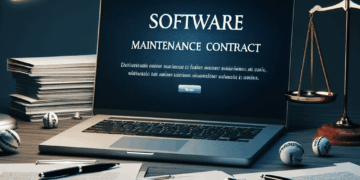No products in the cart.
A software maintenance contract, also known as a maintenance contract or support contract, is a legal agreement between a software provider and a customer for the ongoing care, maintenance and support of software after its initial installation or commissioning.
Key Facts
- Software maintenance contract regulates maintenance and support after initial installation of the software.
- Legal classification includes service contract, work contract and rental contract.
- Important components are the scope of services, response times and remuneration.
- Types of care services include corrective, adaptive and preventive care.
- Customers benefit from predictable costs and rapid assistance in the event of problems.
- Challenges include data protection risks and vendor lock-in.
- Current trends are cloud-based maintenance and automated maintenance processes.
Legal classification
1. service contract (§§ 611 ff. BGB): Usually classified as a service contract, as it involves ongoing services
2. contract for work (§§ 631 ff. BGB): For specific, definable services such as troubleshooting
3. rental agreement (§§ 535 ff. BGB): For the provision of software updates
Main components of a software maintenance contract
1. scope of services: definition of maintenance services (e.g. updates, troubleshooting, support)
2. response times: Definition of deadlines for responding to fault reports
3. remuneration: regulations on costs and payment modalities (often as a regular lump sum)
4 Term and termination: Provisions on contract duration and notice periods
5. service level agreements (SLAs): Agreements on the quality and scope of services
6. obligations of the customer to cooperate: e.g. provision of information, access
7 Liability and warranty: regulations on limitations and exclusions of liability
8. data protection and IT security: provisions for handling sensitive data
Types of care services
1. corrective maintenance: rectification of errors and faults
2. adaptive maintenance: adapting to changing system environments
3. perfect care: improvement and expansion of functions
4. preventive care: preventive measures to avoid problems
Advantages for customers
1. ensuring the functionality and up-to-dateness of the software
2. predictable costs for maintenance and support
3. quick help with problems and faults
4. regular updates and improvements
Advantages for software providers
1. regular, predictable income
2. long-term customer loyalty
3. early detection of problems and potential for improvement
4. possibility of continuous product improvement
Challenges and risks
1. distinction between warranty and chargeable care
2. technological changes may require adjustments to the contract
3. dependence of the customer on the software provider (vendor lock-in)
4. data protection risks associated with remote maintenance and access to customer systems
Current trends and developments
1. cloud-based software maintenance: increasing importance of remote maintenance and updates
2 Automated maintenance processes: Use of AI and machine learning in software maintenance
3. flexible contract models: pay-per-use or modular maintenance packages
4. increased security requirements: Greater focus on IT security and data protection
Conclusion
Software maintenance contracts are an essential part of the software life cycle and contribute significantly to the long-term functionality and value retention of software solutions. They offer benefits to both customers and providers, but require careful drafting and regular adaptation to technological and legal developments. In an increasingly digitalized business world, these contracts are becoming even more important and are developing into complex service agreements that go far beyond mere troubleshooting.





















